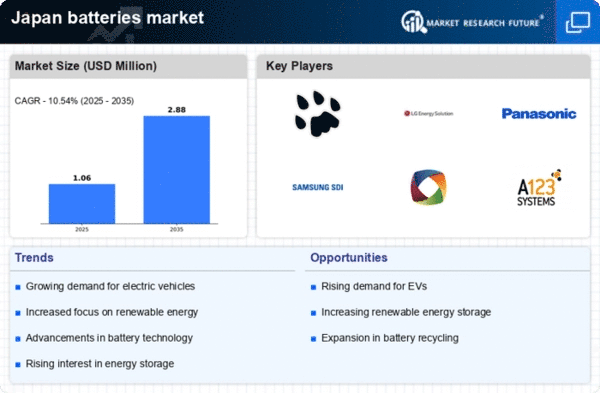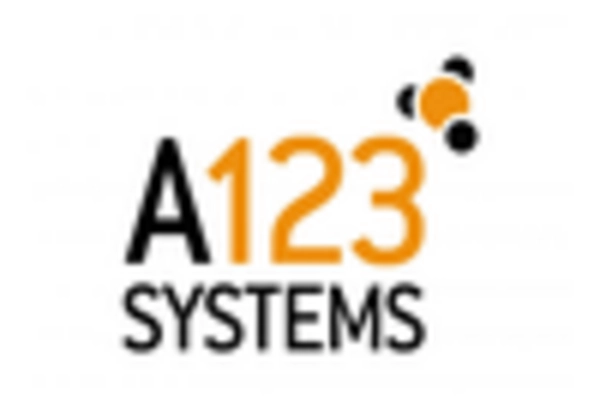Surge in Renewable Energy Adoption
The increasing emphasis on renewable energy sources in Japan is driving the batteries market. As the country aims to reduce its carbon footprint, the integration of solar and wind energy systems is becoming more prevalent. This shift necessitates efficient energy storage solutions, which batteries provide. In 2025, the renewable energy sector is projected to account for approximately 30% of Japan's total energy consumption. Consequently, the demand for batteries, particularly lithium-ion types, is expected to rise significantly, as they are essential for storing energy generated from these renewable sources. This trend indicates a robust growth trajectory for the batteries market, as energy storage becomes a critical component of Japan's energy strategy.
Increased Demand for Consumer Electronics
The growing consumer electronics sector in Japan is significantly impacting the batteries market. With the proliferation of smartphones, laptops, and wearable devices, the demand for portable power sources is surging. In 2025, the consumer electronics market is anticipated to grow by 5%, further driving the need for high-performance batteries. This trend is particularly evident in the demand for lithium-ion batteries, which are favored for their lightweight and efficient energy storage capabilities. As manufacturers strive to meet consumer expectations for longer battery life and faster charging times, the batteries market is poised for substantial growth, fueled by the electronics industry's expansion.
Expansion of Electric Public Transportation
The expansion of electric public transportation systems in Japan is a pivotal driver for the batteries market. As cities invest in electric buses and trains to reduce urban pollution, the demand for high-capacity batteries is increasing. By 2025, it is estimated that electric public transport will account for 20% of all public transport in major Japanese cities. This shift not only enhances the sustainability of urban mobility but also stimulates growth in the batteries market, as manufacturers seek to develop batteries that can support the operational demands of electric vehicles. The integration of advanced battery technologies in public transport is likely to set a precedent for future developments in the sector.
Technological Innovations in Energy Storage
Technological advancements in energy storage systems are reshaping the batteries market in Japan. Innovations such as solid-state batteries and enhanced lithium-ion technologies are emerging, offering improved energy density and safety features. These developments are likely to attract investments, with the market for advanced battery technologies projected to reach $10 billion by 2027. Furthermore, the Japanese government is actively supporting research and development initiatives aimed at fostering innovation in battery technologies. This focus on cutting-edge solutions is expected to enhance the competitiveness of the batteries market, positioning Japan as a leader in energy storage technology.
Government Initiatives for Battery Recycling
Japan's commitment to sustainability is reflected in its government initiatives aimed at promoting battery recycling. The batteries market is likely to benefit from policies encouraging the recovery and reuse of battery materials. In 2025, the Japanese government plans to implement stricter regulations on battery disposal, which could lead to a recycling rate of over 50% for used batteries. This focus on circular economy principles not only addresses environmental concerns but also reduces the demand for raw materials, thereby stabilizing prices in the batteries market. As recycling technologies advance, the market is expected to evolve, creating new opportunities for businesses involved in battery production and recycling.
















